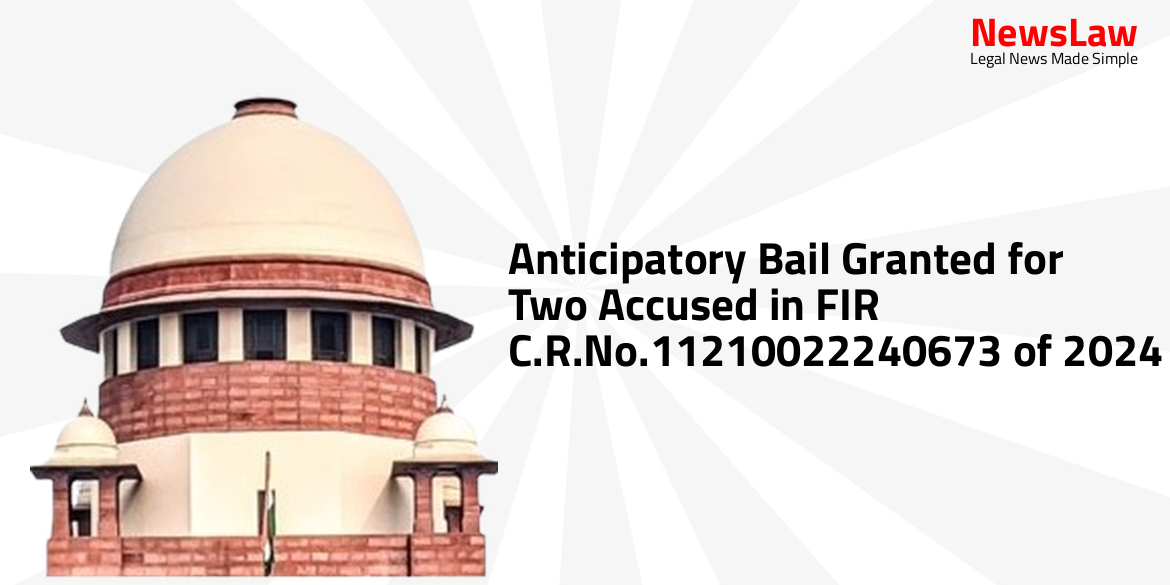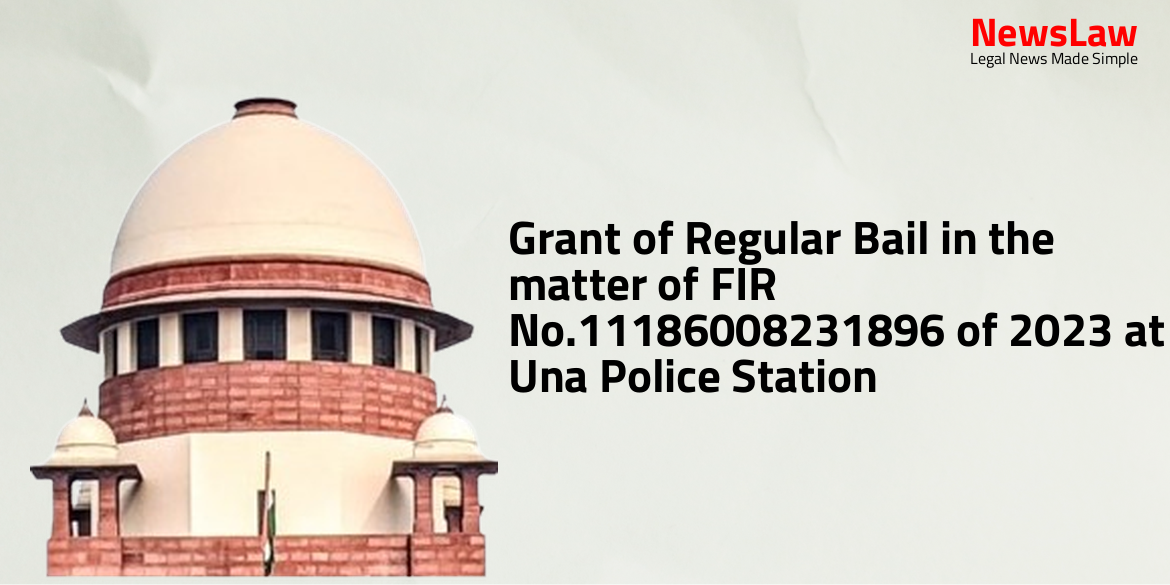In a recent legal development, the Gujarat High Court has ruled on the Revision Application of Mr. Tirmizi against the State of Gujarat. The case involved intricate legal arguments and a thorough examination of evidence presented. Stay informed on the details of this important judgement by reading further.
Facts
- The de-facto complainant challenged the order of acquittal passed by the Additional Sessions Judge, Mehsana
- The complainant alleged that the accused came to his home and threatened him, asking him to leave the village
- The accused were acquitted from charges under various sections of the Indian Penal Code and the Bombay Police Act
- The complainant filed a Revision Application as the accused pleaded not guilty and claimed to be tried.
- Prosecution examined 08 witnesses and produced 15 documentary evidences before the Sessions Court.
- Various incriminating circumstances were put to the accused during Section 313 examination by the Sessions Court.
- Accused allegedly threatened the complainant and set their houses on fire, leading to charges against them.
- Accused denied all incriminating circumstances as false and claimed innocence.
- After analysis, charge-sheet was filed in the Court of JMFC, Vijapur.
- Investigating agency recorded statements of witnesses and drew various Panchnamas.
- Accused were acquitted initially but were later charged by the Sessions Judge and case was committed to Sessions Court, Mehsana.
Arguments
- Learned advocate Mr. Tirmizi argued that there is direct evidence against the accused.
- The learned APP argued that the State has accepted the impugned order without challenge, and therefore, no interference is necessary.
- Witnesses identified the accused setting ablaze houses, properties, and a holy shrine belonging to the complainant.
- The learned Sessions Court overlooked this evidence, leading to a serious error of law and facts.
- Houses were set on fire, and movable properties were looted; this evidence was presented but not believed by the Court.
- The offence occurred after the Godhra Train Carnage, implying a threat to a particular community, justifying the delay in filing the FIR.
- Specific evidence pointed out incidents of arson and looting of articles in the house, but the Court deemed it unnatural to acquit the accused.
Analysis
- The jurisdiction to invoke the order of acquittal in revision by a private complainant should not be exercised lightly and only in exceptional cases where there is a manifest illegality or a gross miscarriage of justice.
- The examination of the case for irregularity or illegality in the appreciation of evidence must focus on whether there is a patent illegality or incorrect application of legal procedures.
- The delay in filing the FIR, discrepancies in witness testimonies, and lack of material evidence like the FSL report proved fatal to the prosecution’s case.
- The involvement of the accused in the alleged incident was not firmly established, as witnesses failed to specifically identify them and the investigating officer did not find a role of the accused in the crime.
- The discretion in exercising revisional jurisdiction should be within the confines of the Cr.P.C. to prevent any miscarriage of justice, and the High Court should intervene only in exceptional cases of manifest error or procedural defects leading to a flagrant miscarriage of justice.
- An application under section 397 and section 401 of the Cr.PC was made by the accused.
- If an application has been made to either the High Court or the Sessions Judge, no further application by the same person shall be entertained by the other.
- The powers of revision conferred by sub-section (1) of section 401 shall not be made to the prejudice of the accused or other person unless they have had an opportunity of being heard in their defense.
- The High Court and Sessions Judge can call for and examine the record of any proceeding for the purpose of reviewing the correctness, legality, or propriety of any finding, sentence, or order passed.
- The High Court may exercise any powers conferred on a Court of Appeal or a Court of Session based on the records of the proceeding.
- The High Court is not authorized to convert a finding of acquittal into a conviction.
- No order under the mentioned sections can be exercised in relation to any interlocutory order in the proceeding.
- The High Court does not normally interfere with judgments of acquittal unless there is a clear error of law or procedure.
- Private complainants can file a revision application in specific circumstances, such as when the trial court improperly excludes evidence the prosecution wishes to present.
- Revisional jurisdiction at the instance of a private complainant can only be exercised in exceptional cases to correct a manifest illegality or prevent a serious miscarriage of justice.
- The Court, in revisional jurisdiction, should focus on assessing the correctness, legality, and propriety of the findings, sentence, or order without substituting its own conclusions based on a detailed examination of the evidence.
- High Courts, in revisional jurisdiction, should refrain from deeply re-examining oral and medical evidence to contradict consistent findings by lower courts.
- Discrepancies that do not undermine the core testimony of witnesses should not be given undue significance, especially when key probabilities support the witnesses’ version.
- In this case, the State has not appealed against the acquittal order, and the complainant has filed a revision application based on the police report.
- Revisional jurisdiction by the High Court on a private party’s application in a case initiated through a police report can be exceptional as per legal precedents.
- The revisional jurisdiction granted to High Courts should not be taken lightly, especially when invoked by a private complainant against an acquittal order, which the government can appeal against.
- Sub-Section (3) of Section 401 of the Code of Criminal Procedure prohibits converting a finding of acquittal into a conviction.
- The learned Sessions Judge did not commit any illegality in acquitting the accused.
- The complainant failed to prove their case for the High Court to exercise revisional jurisdiction.
- The de-facto complainant did not establish exceptional circumstances to show a miscarriage of justice or public interest.
Decision
- The learned Sessions Judge did not commit any error in understanding the law.
- The Revision Application is dismissed and the case is being sent back to the Trial Court.
- The revision against respondents no. 10 and 15 stands abated due to their reported expiry.
Case Title: HIMMATKHAN TAJKHAN MALEK Vs. THE STATE OF GUJARAT
Case Number: R/CR.RA/309/2005



